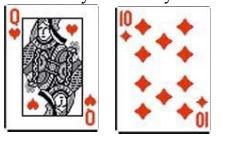Playing Texas Hold'em Online, The Professional Guide - Chapter 7
The Importance of Table Position in Texas Hold'em
Insider Tip: Position is the most overlooked aspect of games like Texas Hold'em by beginners. And that's a huge shame. It costs these players a lot of pots.
Your position at the table is based simply on your position in relation to the dealer. The dealer is at the most advantageous position, as he/she gets to see how all the other players at the table react before making their own decision.
The chances of your hand being a winner increase as more and more people fold their hand.
Yes, if you have said KQs and are going up against 1 other player, your chances are not bad - but if you're going up against 8 or 9 others who feel they too have a hand worth betting - your KQs is not nearly so strong.
Now, if you are in an early position (meaning you are among the first who has to bet) then you have no idea how many players will be playing this hand when it's time to bet or fold your hole cards.
On the other hand, if you are in a late position (meaning you are among the last to call) you not only have the knowledge of who and how many players are in on this hand - but if anyone has made aggressive bets. If you are in a late position and hold an OK hand - say a small pair or a KJ -if everyone before you have folded - you've got a strong hand but if everyone before you have called or raised – you know you've got a weak hand.
As you see - this has little to do with your hand - but more the circumstances in which it is played.
The person to the left of the dealer is not only the small blind (SB), but must act first after the flop.
The person to the left of the small blind is the big blind (BB). This person is already obligated to the game and is in another early position.
The person to the left of the big blind acts first before board cards are dealt. This is often referred to as being under the gun. The clockwise motion of play allows those who act later (in late position) to be at an advantage. As a result, those in late position can play weaker hands or gambling hands with less fear of financial obligation or loss.
Insider Tip: The blind positions . . . and the player under the gun needs to be very selective with their hands. They don't have the privilege of watching other players betting/raising before they must decide if they want to stay in themselves.
For example, let's say you're under the gun (first to act). You have Jack-Ten, unsuited. The player to bet after you raises, and everyone but you fold. Now you're in a jam.

Chances are good that this player has a better hand than you, with at least an ace or a pocket pair. Unfortunately, you've already bet, because you had no idea or no way to tell what other players at the table had in the pocket.
Insider Tip: You will always . . . throughout the game, be acting before this player. This positional advantage will continue throughout this hand.
On the other hand, being in the dealer's position not only gives you the benefits of observing how the other players are betting, but it also gives you the ability to adjust the size of the pot.
After all other players have bet, a raise by the player in the dealer's position could potentially double the size of the pot (assuming no one folds). Since the players have already committed to one bet, it's easier to commit to a second (or a third or fourth!).
Insider Tip: If you watched a poker table over a space of many days, you would begin to notice that the winning hand tends to move around the table in a clockwise position. Long-term studies have shown that over time, the win tends to move in that direction.
Why? Because your knowledge of the hand increases your chance of winning.
The blinds and player 'under the gun' have the least knowledge. As the play moves around the table, each player gains more knowledge about what the other players are doing. Are they in? Are they hesitating? Are they raising? Are they folding? The last player to bet has the maximum knowledge and therefore the best position –they are in what is sometimes called the 'cat-bird seat'.
Knowing how money moves around a table can give you a sense of the importance of position at the table.
Insider Tip: One of the little-understood benefits of last position at the table is that you get a lot of free cards as well.
When you get a free card, you're taking a free ride. If nobody bets during a round, you get that opportunity at zero cost. That's what a free card is. Fine. A governing concept of free cards is that you get lots more of them when you're last to act than when you're first to act. Even better, when you're last to act, you get control over whether or not you take a free card. You can accept the opportunity, or you can bet and deny the same opportunity to your opponents.
Befriend players to your left; declare war on players to your right.
